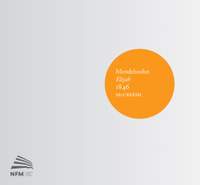Recording of the Week,
Mendelssohn's Elijah from McCreesh
Ever since their fantastic Prom performance last summer, I’ve been eagerly awaiting the release of Mendelssohn’s Elijah from Paul McCreesh and the Gabrieli Consort & Players. They went into the studio (well Watford Colosseum actually) the week after the Prom but I only heard the results in full for the first time last week.

At the time of its first performances in Birmingham Town Hall in 1846, Elijah was hailed as one of the great oratorios alongside Handel’s ‘Messiah’. It became by far the most popular oratorio of the 19th Century but seems to have fallen from grace a little since then. It tells the story of the prophet with imposing grandeur, inspirational orchestration and beautiful arias, recitatives and choruses.
Mendelssohn revised the work the year after the premiere for the 1847 London performance, and it is that version which is generally heard today. For this recording McCreesh also essentially uses that version, but uses the Birmingham premiere as the basis for many other decisions, replicating both the size of the orchestra (a very large string ensemble of 92 players, with doubled woodwind, trumpets, drums and ophicleides) and a chorus of over 300 made of the Gabrieli Singers and reinforced by the talented Gabrieli Young Singers’ Scheme and the Wroclaw Philharmonic Choir.
The use of nineteenth century instruments changes the sound world entirely from what you might be used to hearing, with slide trumpets creating a rasping edge to the sound and tremendous power and depth provided by serpents and ophicleides (including a contrabass model known as the ‘monstre’ borrowed from America as that is the only similar instrument remaining in world in a playable condition!) and huge drums.
The sound of such a large string orchestra playing entirely on gut strings and with very little vibrato is both compelling and beautiful, yet still has the range of character to play both lightly and delicately and also with richness and intensity.
The four solo singers – Rosemary Joshua, Sarah Connolly, Robert Murray and Simon Keenlyside – are all in fine voice. Keenlyside delivers a committed account of the role of Elijah, and you do hear much of the anger and moral struggle which the character possesses. Maybe not as forceful as it could be, nor as heart-felt, but then this is an oratorio not an opera, and in the ensembles the four voices blended excellently.
The other big element in the success of this recording is the huge choir, who sing with an immediacy and consistency of phrasing which you wouldn’t think possible from such a large group. Equally implausible is the delicacy and tenderness which they can create, whilst it almost goes without saying that at the other extreme, the climaxes are truly stunning. McCreesh’s tempi are well judged and help build the real power and drama of this performance. This is big, grand choral singing of the Victorian scale, not always subtle but hugely effective.
In all this is staggeringly good. Approaching the work in this way fills a gap which I didn’t even realise was there, but now I’ve heard it I think it will be first choice for a while to come. Thoroughly recommended.
Rosemary Joshua (soprano), Jonty Ward (treble), Sarah Connolly (mezzo-soprano), Robert Murray (tenor) & Simon Keenlyside (baritone), Wroclaw Philharmonic Choir, Gabrieli Young Singers' Scheme & Gabrieli Consort & Players, Paul McCreesh
Available Formats: 2 CDs, MP3, FLAC, Hi-Res FLAC



